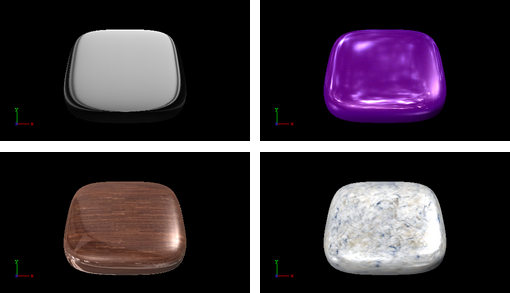The Lacquered Surface Shader plug-in simulates smooth lacquered surfaces lit by a highlight.
On the clear coat layer, the surrounding is reflected (from a cube map). The reflection blurriness can be controlled to create the appearance of a rougher surface.
Note: This plug-in is located in: Plugins -> Shader -> RTTAdvancedMaterials
Lacquered Surfaces Shader Properties
Environment Reflectivity: Manipulates the influence of the reflection color from the environment map on the resulting color.
Reflection Multiplier/Exposure: Affects the exposure of the environment map. This is especially helpful when working with HDR images.
Gamma of EnvMaps: Controls the gamma correction of the environment map. This is once again particularly helpful when working with HDR images.
Blur Reflection: States how much the environment reflection is blurred to create the impression of a rougher surface.
Fresnel Minimum, Fresnel Scale and Fresnel Exponent: Affects the Fresnel effect upon the reflection.
Environment Map: Is a cube map that describes the environmental surrounding used to calculate reflections.
Technique: Shows a list of available techniques.
PixelShading: Is a technique to be used for finer details on the surface.
VertexShading: Is a technique to be used for objects in the distance or for highly tessellated objects.
Lacquered Surfaces Shader Best Practices
Apart from the parameters in the plug-in container, it is necessary to assign a material and a texture as a color/basic texture. Do not forget to adjust material parameters in addition, such as ambient, diffuse, specular color and shininess, to achieve the required look for your surface.

